2025 CWAJ Scholars: Empowering Global Women
Photos: College Women’s Association of Japan
On May 28, the College Women’s Association of Japan (CWAJ) held its annual General Meeting in Tokyo, celebrating the power of education to transform lives across borders. The event introduced the recipients of the 2025 CWAJ Scholarships, outstanding women from Japan and abroad who will pursue advanced degrees in diverse fields ranging from healthcare and computer science to environmental policy and peace studies.
Founded in 1949, CWAJ offers a range of scholarships supporting both Japanese and non-Japanese women, as well as visually impaired students, in pursuing graduate studies. Scholarships include the CWAJ Graduate Scholarship for Japanese Women to Study Abroad, the CWAJ Cartier Scholarship focusing on entrepreneurship, the CWAJ Graduate Scholarship for Non-Japanese Women to Study in Japan and scholarships for visually impaired students to study either in Japan or abroad. These awards are based on academic excellence, the quality of the proposed study and the applicant’s potential to contribute to society.
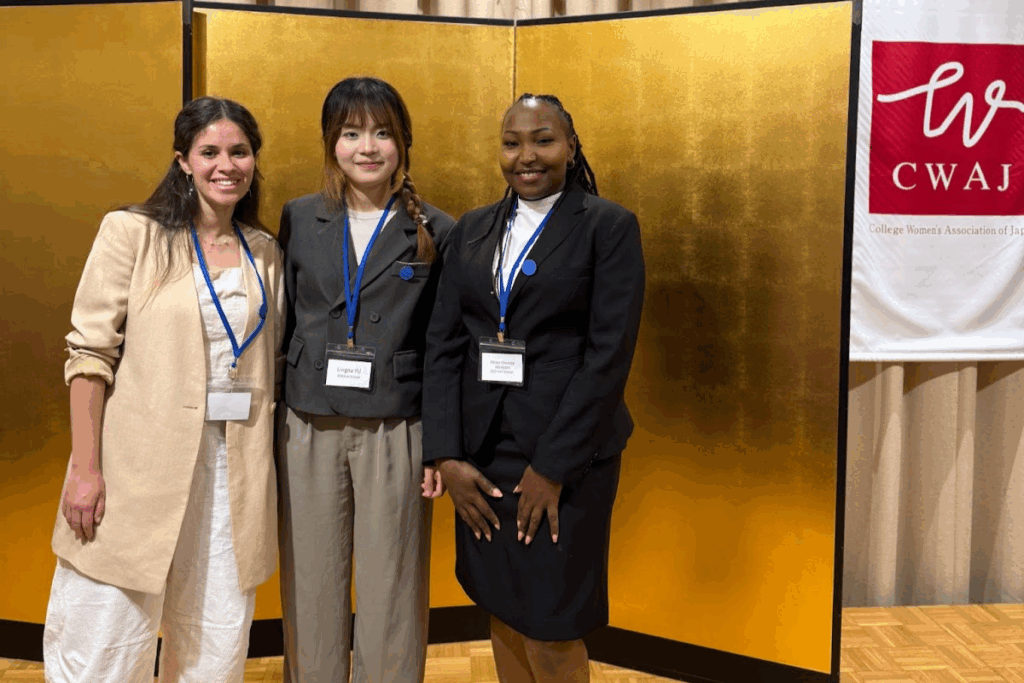
I had the opportunity to interview two scholarship recipients about their work and future plans. Sofía Huerta Nunes, a Mexican human rights advocate pursuing a PhD in Peace and Conflict Studies at Tokyo University of Foreign Studies, and Wiliter Chemutai Momanyi, a Kenyan environmental scientist researching how artificial intelligence can support sustainable farming in the face of climate change. Both women were awarded the CWAJ Cultural Exchange Graduate Scholarship for Non-Japanese Women to Study in Japan.
Researching Gender-Based Violence in Okinawa: Sofía Huerta Nunes’ Peace Studies Journey
Sofía’s journey into the study of gender-based violence in militarized zones began in Mexico, where she was studying human rights and business management amid the country’s growing feminist movement. Through her work at the state prosecutor’s office on sexual crimes, she began to understand the close connection between sexual violence and the militarization of public security.
“Mexico’s militarization has led to a huge amount of human rights violations,” she said. That connection between militarized structures and systemic violence shaped the direction of her research. “I could see the connection between gender-based violence, sexual violence and a militarized logic of the state… and I think that that connection for me was important to understand.”
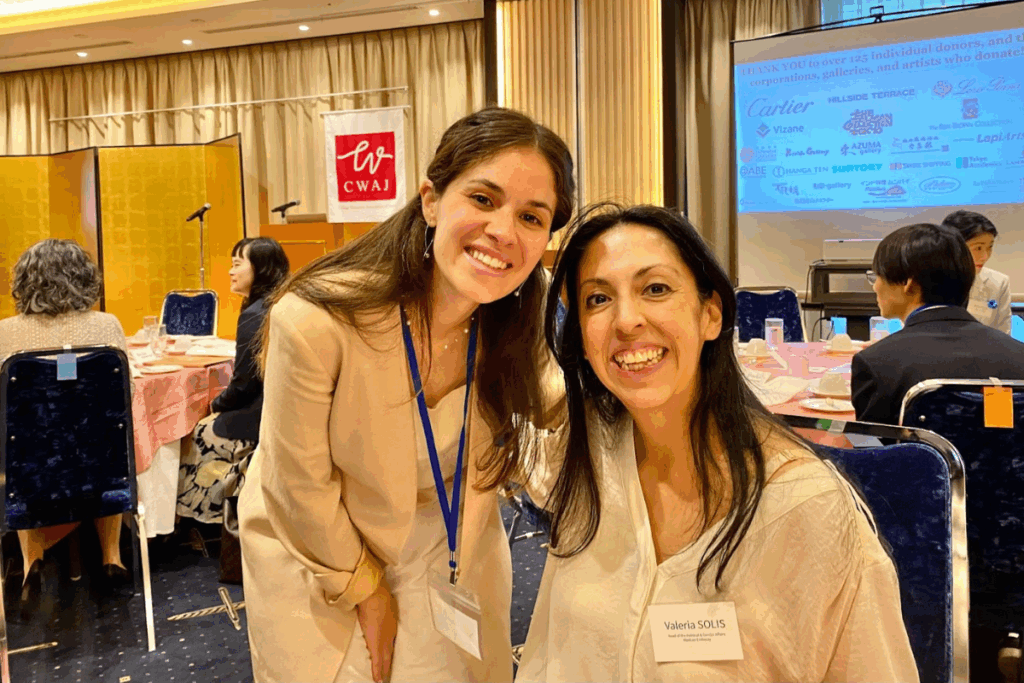
Sofía’s research led her to explore issues in Okinawa, where U.S. military presence has created a complex and painful history of gender-based violence. “The way that history has been told and the way feminism is understood is often through a Western lens,” she said. “Looking at the victims of gender-based violence in Okinawa brought for me a new perspective on how to approach combatting these issues. Because I was here in Japan learning about gender-based violence from another cultural perspective different from a Western one, I was able to open my mind to new ways of thinking and understanding my own research.”
Her master’s research focused on cases of sexual torture committed by state actors in Mexico under the militarization of public security—a topic that had not been presented before at her university in Japan. Now, for her PhD, Sofia plans to research gender-based violence in both Okinawa and at the U.S.–Mexico border.
Asked what advice she would give to women considering a path in human rights and activism, Sofía said: “Do it. Go and do it, speak up and take up space in public places that are mainly led by men. And most importantly, help each other.”
Empowering Kenyan Farmers Through AI: Wiliter Chemutai Momanyi’s Environmental Science Research
Wiliter Chemutai Momanyi’s journey into environmental science and artificial intelligence is rooted in both technological curiosity and personal experience. Growing up in Kenya, she watched her grandmother tend to crops such as pumpkin and potatoes, despite unpredictable weather and labor-intensive conditions. “At one point in time there was no rain for almost three or four months and her crop just dried in the field,” Wiliter said. “When I look at my grandmother, I see a woman of resilience.”
This memory is what inspired Wiliter’s mission: to harness AI to simplify and enrich the lives of smallholder farmers. “Technology has really been moving very fast… in healthcare, transport and communication. So my question was: why not agriculture?” she said. Through her research, she envisions tools that allow farmers to receive personalized, data-driven advice via simple text messages. “A farmer can just message and say, ‘I want to know what to apply to my potato.’” The system could then guide them through a full growing cycle from fertilizer application to harvesting.
Her work also explores smart irrigation systems, such as AI-powered sensors that detect soil moisture and automate watering. Rather than reinventing the wheel, Wiliter wants to look at what farmers are already doing, what AI has the potential to do and bring the two together. “It’s like a nexus between farmers’ coping strategies and what AI can bring in as a solution,” she said.
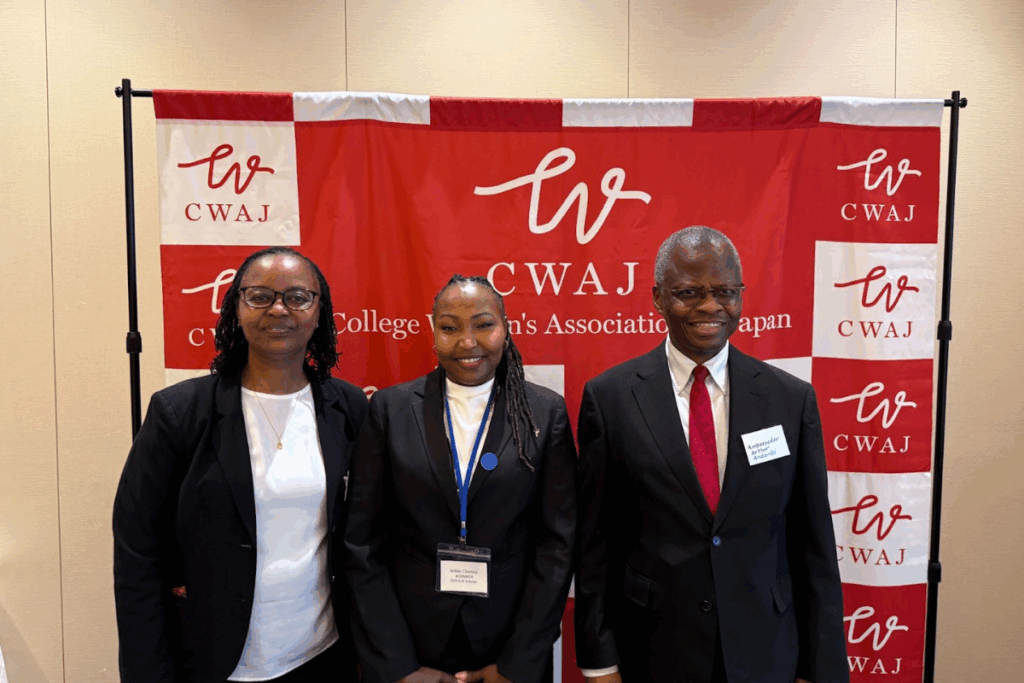
For Wiliter, AI is not about replacing farmers, but empowering them. “We are not seeing it as an enemy… it is coming to complement our jobs, not take them away,” she said. “Imagine a farmer just paying a thousand Kenyan shillings to let a driverless machine come to their farm and help them do seeding, and it just takes an hour or less. Wouldn’t that be amazing?”
Wiliter envisions a future where farming is not only sustainable but also enjoyable, thanks to the power of AI and technology, so that farming is transformed from a struggle to a fulfilling and climate-resilient livelihood.
Her advice for young girls: “Put your best foot forward and believe in yourself. It begins with passion. It begins with self-belief. It begins with you putting your foot forward and committing to your path and yourself.”
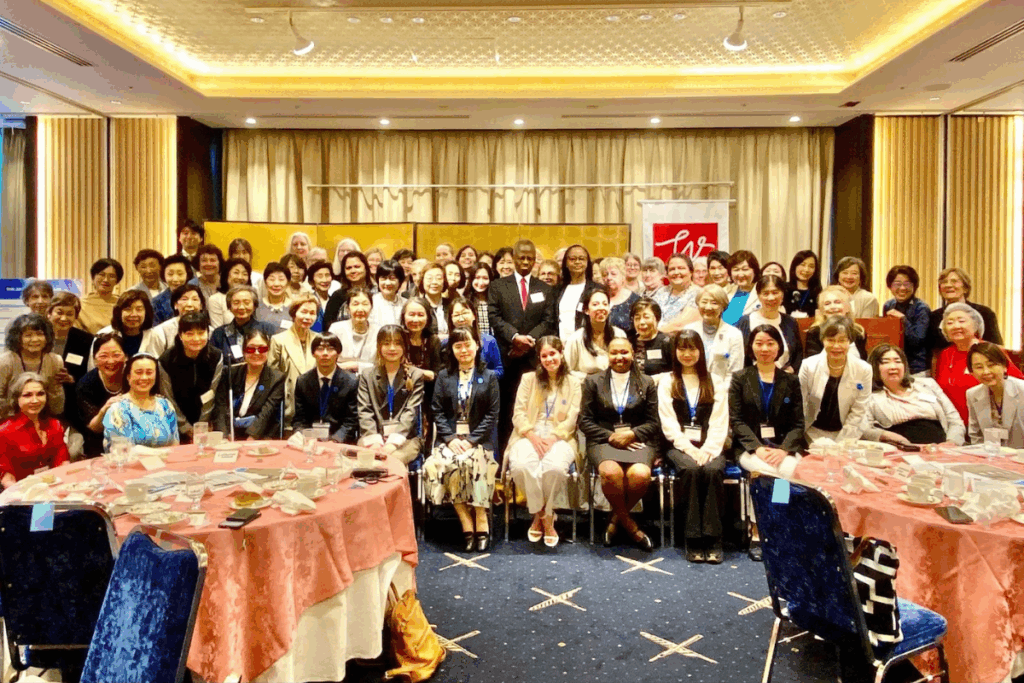
Meet The 2025 CWAJ Scholarship Recipients Advancing Global Education
The other 2025 CWAJ scholarship recipients include Miina Koyama, the second-ever recipient of the CWAJ Cartier Scholarship for Japanese Women to Study Abroad. A computer science graduate from Waseda University, Miina will pursue a Master’s degree in Educational Technology at Carnegie Mellon University, focusing on personalized, data-driven learning environments that support underrepresented groups in STEM.
Haruka Namekawa is a recipient of the CWAJ Cultural Exchange Graduate Scholarship for women in Japan to Study Abroad. She will be attending Duke University’s Fuqua School of Business. After several years in healthcare consulting, she plans to contribute to Japan’s aging society through better hospital management practices.
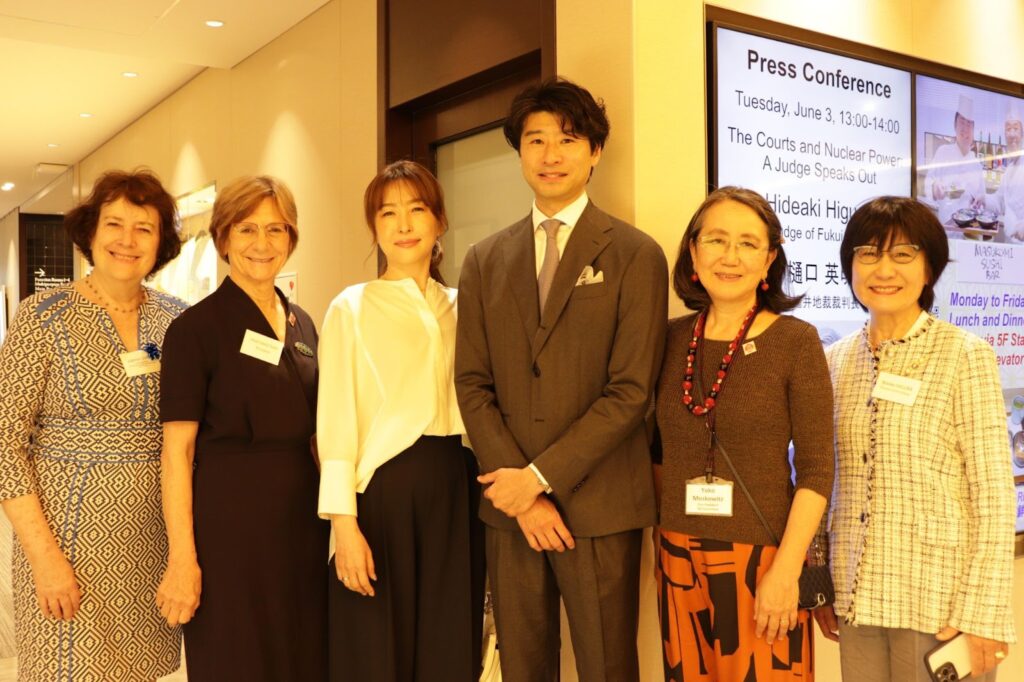
Lingna Yu received the CWAJ Graduate Scholarship for Non-Japanese Women to Study in Japan and is pursuing a PhD at Osaka University’s Graduate School of Frontier Biosciences. She is originally from China and studied biomedical science at Shanghai Jiao Tong University. Currently, she is working to improve accessibility to IVF-ET treatments by applying technologies such as 3D embryonic tracking and machine learning. She also promotes walking football for senior citizens in China as part of her broader vision for community health and well-being.
The event also recognized two remarkable scholars with visual impairments: Tomoyuki Umeyama, a chemistry researcher navigating experiments with limited vision, and Miu Kitana, who is working on inclusive educational design that supports students with low vision through optimized text display.
Also in attendance was Ririna Kaneko, a 2017 recipient of the Scholarship for the Visually Impaired to Study in Japan. In her speech, Ririna reflected on how the scholarship helped her navigate her career journey, and encouraged this year’s scholars to embrace the possibilities ahead. She now works at Apple.
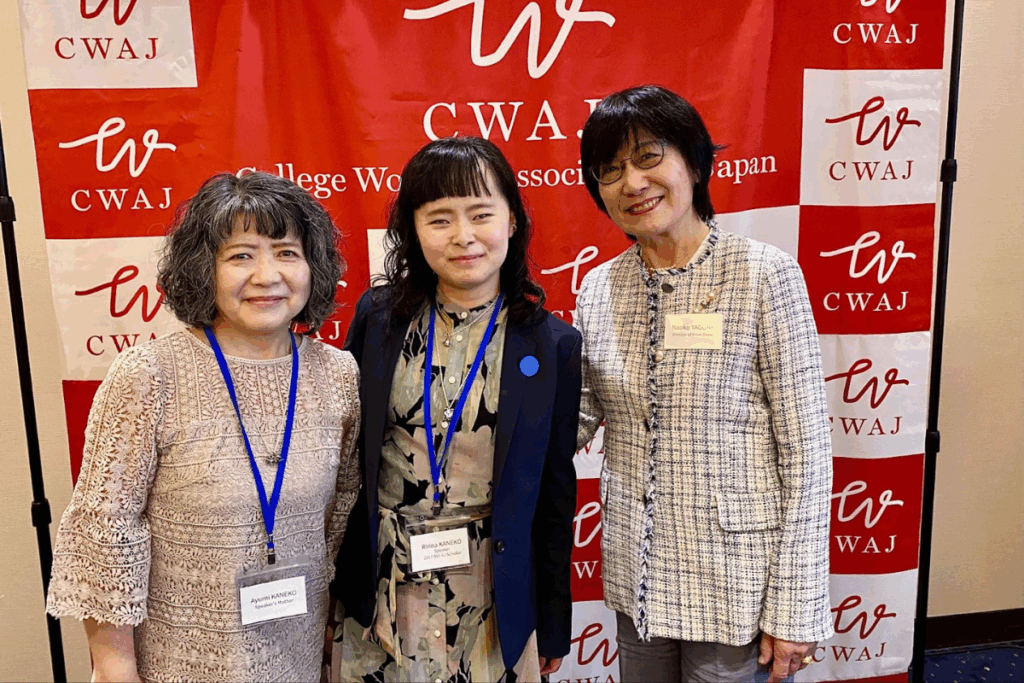
The scholars’ introductions were followed by a celebratory lunch where CWAJ members and guests had the opportunity to mingle with the recipients and learn more about their research and the impact their studies are making both in Japan and their home countries.

